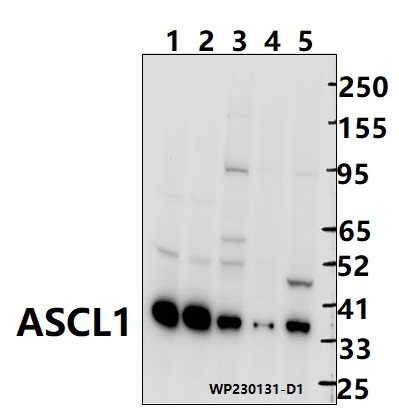Product Name :
ASCL1 (E158) polyclonal antibody Background :
Transcription factor that plays a key role in neuronal differentiation: acts as a pioneer transcription factor, accessing closed chromatin to allow other factors to bind and activate neural pathways. Directly binds the E box motif (5'-CANNTG-3') on promoters and promotes transcription of neuronal genes. The combination of three transcription factors, ASCL1, POU3F2/BRN2 and MYT1L, is sufficient to reprogram fibroblasts and other somatic cells into induced neuronal (iN) cells in vitro. Plays a role at early stages of development of specific neural lineages in most regions of the CNS, and of several lineages in the PNS. Essential for the generation of olfactory and autonomic neurons. Acts synergistically with FOXN4 to specify the identity of V2b neurons rather than V2a from bipotential p2 progenitors during spinal cord neurogenesis, probably through DLL4-NOTCH signaling activation. Involved in the regulation of neuroendocrine cell development in the glandular stomach (By similarity). Product :
Rabbit IgG, 1mg/ml in PBS with 0.02% sodium azide, 50% glycerol, pH7.2. Storage&Stability :
Store at 4°C short term. Aliquot and store at -20°C long term. Avoid freeze-thaw cycles. Specificity :
ASCL1 (E158) polyclonal antibody detects endogenous levels of ASCL1 protein. Immunogen :
Synthetic peptide, corresponding to Human ASCL1. Conjugate :
Unconjugated Modification :
Unmodification
ASCL1 (E158) polyclonal antibody Background :
Transcription factor that plays a key role in neuronal differentiation: acts as a pioneer transcription factor, accessing closed chromatin to allow other factors to bind and activate neural pathways. Directly binds the E box motif (5'-CANNTG-3') on promoters and promotes transcription of neuronal genes. The combination of three transcription factors, ASCL1, POU3F2/BRN2 and MYT1L, is sufficient to reprogram fibroblasts and other somatic cells into induced neuronal (iN) cells in vitro. Plays a role at early stages of development of specific neural lineages in most regions of the CNS, and of several lineages in the PNS. Essential for the generation of olfactory and autonomic neurons. Acts synergistically with FOXN4 to specify the identity of V2b neurons rather than V2a from bipotential p2 progenitors during spinal cord neurogenesis, probably through DLL4-NOTCH signaling activation. Involved in the regulation of neuroendocrine cell development in the glandular stomach (By similarity). Product :
Rabbit IgG, 1mg/ml in PBS with 0.02% sodium azide, 50% glycerol, pH7.2. Storage&Stability :
Store at 4°C short term. Aliquot and store at -20°C long term. Avoid freeze-thaw cycles. Specificity :
ASCL1 (E158) polyclonal antibody detects endogenous levels of ASCL1 protein. Immunogen :
Synthetic peptide, corresponding to Human ASCL1. Conjugate :
Unconjugated Modification :
Unmodification
-
 Western blot (WB) analysis of ASCL1 (E158) polyclonal antibody at 1:1000 dilution Lane1:The brain tissue lysate of mouse(30ug) Lane2:The brain tissue lysate of Rat(30ug) Lane3:K562 whole cell lysate(30ug) Lane4:BV2 whole cell lysate(30ug) Lane5:A2780 cell membrane lysate(30ug)
Western blot (WB) analysis of ASCL1 (E158) polyclonal antibody at 1:1000 dilution Lane1:The brain tissue lysate of mouse(30ug) Lane2:The brain tissue lysate of Rat(30ug) Lane3:K562 whole cell lysate(30ug) Lane4:BV2 whole cell lysate(30ug) Lane5:A2780 cell membrane lysate(30ug)
Bioworld Biotech only provide peptides for our antibodies and do not provide additional peptide customization services.
Price/Size :
USD 368/1mg/vial
Tips:
For phospho antibody, we provide phospho peptide(0.5mg) and non-phospho peptide(0.5mg).Describe :
Blocking peptides are peptides that bind specifically to the target antibody and block antibody binding. These peptide usually contains the epitope recognized by the antibody. Antibodies bound to the blocking peptide no longer bind to the epitope on the target protein. This mechanism is useful when non-specific binding is an issue, for example, in Western blotting (WB) and Immunohistochemistry (IHC). By comparing the staining from the blocked antibody versus the antibody alone, one can see which staining is specific; Specific binding will be absent from the western blot or IHC performed with the neutralized antibody.Formula:
Synthetic peptide was lyophilized with 100% acetonitrile and is supplied as a powder. Reconstitute with 0.1 ml DI water for a final concentration of 10 mg/ml.The purity is >90%,tested by HPLC and MS.
Storage:
The freeze-dried powder is more stable. For short time at 2-8°C. For long term storage store at -20°C.
Note :
This product is for research use only (RUO only). Not for use in diagnostic or therapeutic procedures.
 ASCL1 (E158) polyclonal antibody
ASCL1 (E158) polyclonal antibody  Datasheet
Datasheet COA
COA MSDS
MSDS SHIP
SHIP